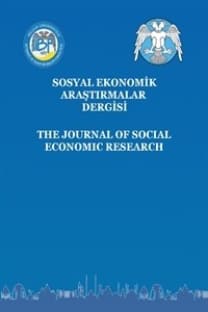EKONOMİK BÜYÜME FARKLILIKLARININ İNCELENMESİ: OECD ÜLKELERİ İÇİN BİR UYGULAMA
Ekonomik Büyüme, Yakınsama Hipotezi, Beşeri Sermaye, Panel Veri Analizi
INVESTIGATION OF ECONOMIC GROWTH DIFFERENCES FROM THE CONVERGENCE HYPOTHESIS PERSPECTIVE: AN IMPLICATION FOR OECD COUNTRIES
- ISSN: 2148-3043
- Yayın Aralığı: Yılda 2 Sayı
- Başlangıç: 2000
- Yayıncı: Selçuk Üniversitesi
EKONOMİK BÜYÜME FARKLILIKLARININ İNCELENMESİ: OECD ÜLKELERİ İÇİN BİR UYGULAMA
Göknur UMUTLU, Fatih Alpaslan YILMAZ, Selin GÜNEL
FİNANSAL GELİŞME VE İKTİSADİ BÜYÜME: STATİK VE DİNAMİK PANEL VERİ ANALİZİ
Murat NİŞANCI, İlyas KARABIYIK, Metin UÇAR
STOK HESAPLARININ DENETİMİNDE İÇ KONTROL SİSTEMİ VE İÇ DENETİMİN ÖNEMİ
KOBİ’LERDE YENİLİK, YENİLİK STRATEJİLERİ VE BİR UYGULAMA
ÇALIŞANLARIN KİŞİLİK ÖZELLİKLERİNİN İŞTEN AYRILMA EĞİLİMİNE OLAN ETKİSİ: BİR ALAN ARAŞTIRMASI
ULUSLARARASI GÜVENLİK SORUNLARI ve ABD’NİN GÜVENLİK STRATEJİLERİ
AVRUPA BİRLİĞİ’NİN DEĞİŞEN NÜFUS YAPISINDA GENÇLER VE AB’NİN GENÇLİK POLİTİKALARI
Elvettin AKMAN, Ekrem Yaşar AKÇAY, Çiğdem ARGUN
TÜRKİYE’DE ENFLASYON VE ENFLASYON HEDEFLEMESİ UYGULAMASININ DEĞERLENDİRİLMESİ
